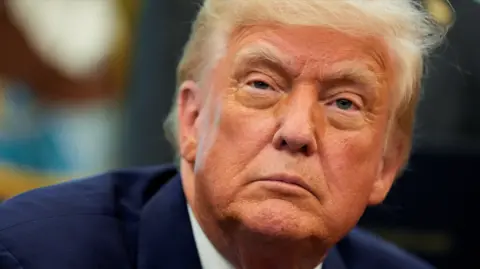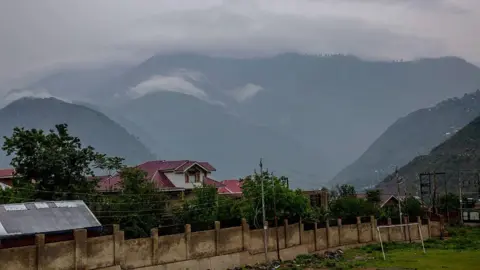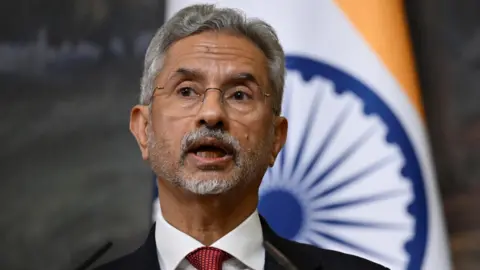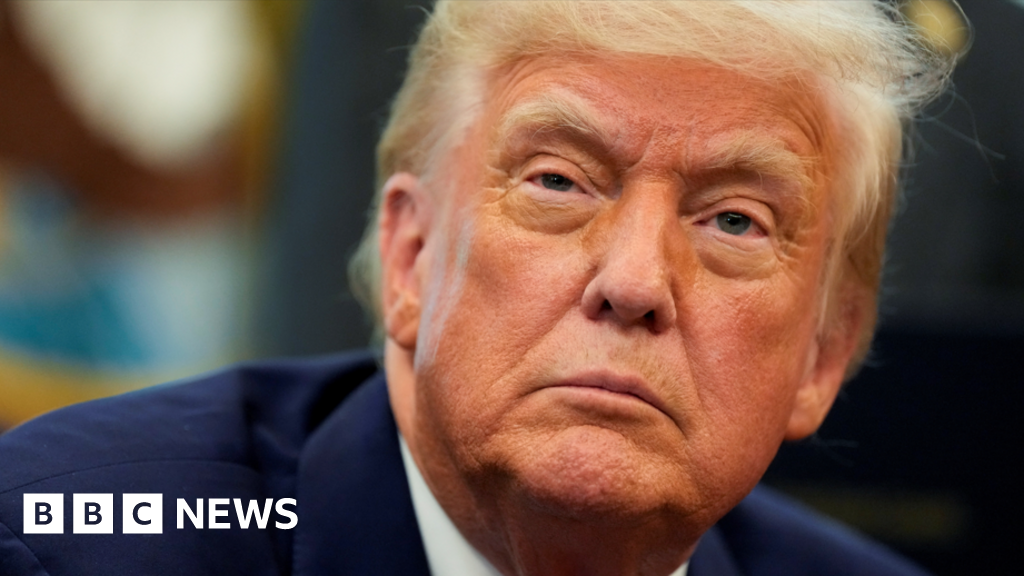South Asia Regional Editor
 Reuters
ReutersFor decades, if there’s one thing that’s been a taboo in the Indian foreign ministry, it is third-party mediation – particularly in the long-running dispute with Pakistan over Kashmir.
Those in the know, then, are not surprised that US President Donald Trump – known for his unorthodox diplomacy – has touched a raw nerve in Delhi.
On Saturday, he took to social media to announce that India and Pakistan – after four tense days of cross-border clashes – had agreed to a “full and immediate ceasefire”, brokered by the US.
Later, in another post he said: “I will work with you both to see if, after a thousand years, a solution can be arrived at, concerning Kashmir.”
The Kashmir dispute dates back to 1947, when India got independence from British rule and was partitioned to create Pakistan. Both neighbours claim the Kashmir region in whole, but administer it only in part.
Several rounds of bilateral talks over the decades have not yielded any resolution. India treats Kashmir as an integral part of its territory and rules out any negotiation, particularly through a third party.
The latest flare-up began after India carried out air strikes on what it called terrorist infrastructure inside Pakistan in the aftermath of the attack on tourists in Indian-administered Kashmir last month, killing 26 people, mainly tourists.
India blames Pakistan of involvement in the incident, a charge denied by Islamabad.
Trump’s intervention came as fighting between the two nuclear-armed rivals was threatening to spiral into a full-blown conflict.
The two sides were using fighter jets, missiles and drones and said they were targeting each other’s military installations, mainly in the border areas.
While US mediators, alongside diplomatic backchannels, prevented a bigger conflagration, President Trump’s offer has put Delhi in a spot.
“Obviously, it would not be welcome by the Indian side. It goes against our stated position for many years,” Shyam Saran, a former Indian foreign secretary, tells the BBC.
 Getty Images
Getty ImagesDelhi’s position on Kashmir has hardened, especially after it withdrew the special status of Jammu and Kashmir in 2019, triggering widespread protests in Kashmir.
President Trump’s recent comments have irked many Indians, who see this as an attempt to “internationalise” the Kashmir dispute.
The main opposition Congress party wanted an explanation from the government and an all-party meeting on the “ceasefire announcements made from Washington DC first”.
“Have we opened the doors to third-party mediation? The Indian National Congress would like to ask if diplomatic channels between India and Pakistan are being reopened,” said the Congress party spokesman Jairam Ramesh.
US Secretary of State Marco Rubio’s statement announcing the ceasefire also said that the two countries have also agreed “to start talks on a broad set of issues at a neutral site”. This has caught the Indians by surprise.
Delhi has refused to hold discussions with Islamabad, accusing its neighbour of supporting what it calls cross-border terrorism.
Historically, India has opposed any third-party mediation, quoting an agreement signed in 1972 after a war between the two countries a year earlier. As per the Simla agreement signed by the country’s leaders, they “resolved to settle their differences by peaceful means through bilateral negotiations”.
Indian officials also argue that even when they reach an understanding with a civilian government in Pakistan, the country’s powerful military launched operations undermining those deals. They point to the Kargil war in 1999, when another conflict between the two countries began after a group of Pakistan-backed militants occupied strategic areas in Indian-administered Kashmir.
The conflict took place months after the then Indian and Pakistani prime ministers agreed to resolve issues through bilateral negotiations and refrain from interfering in each other’s internal matters.
Indian Prime Minister Narendra Modi’s government has not formally responded to President Trump’s offer to mediate.
But Foreign Minister Subrahmanyam Jaishankar said: “India has consistently maintained a firm and uncompromising stance against terrorism in all its forms and manifestations. It will continue to do so.”
It is being seen as an indication that India may not be restarting direct bilateral talks soon.
 Reuters
ReutersThe view from Pakistan is different.
“Pakistan has always wanted third-party mediation in the Kashmir issue in the absence of mutual trust between the two countries,” Imtiaz Gul, the executive director of Centre for Research and Security Studies in Islamabad, tells the BBC.
“Now a superpower is willing to stick its neck out. Pakistan will see this as a moral victory,” Mr Gul says.
Pakistani strategic experts like Syed Muhammad Ali argue it is because of India’s consistent refusal to engage with Pakistan that the international community should step in to avoid any future conflict.
“Kashmir is one of the most critical issues for the international community. The recent rapid escalation proves that the sabre-rattling can go out of hand,” Mr Ali says.
India’s assertive diplomacy, particularly since Modi took over in 2014, has been seen as a sign of its confidence as a rising global economic power.
But it will have to pull off a tough balancing act, to stave off Trump’s advances.
The US has courted India in recent years as a bulwark against an increasingly assertive China. India is a key member of the Quadrilateral Security Dialogue group (Quad), along with the US, Australia and Japan, that was formed to counter Chinese expansionism in the Indo-Pacific.
In recent decades, Washington has also sold modern transport planes, helicopters and other military equipment to Delhi, which is keen to modernise its 1.4 million strong military, that relies heavily on Russian weaponry.
The previous American administrations were aware of India’s sensitivities towards the Kashmir issue and largely stayed away from interfering with it. But with Trump, there’s a question mark over whether that position still holds.
The US is the largest trading partner of India with bilateral trade reaching about $130bn (£98bn) in 2024. Modi’s government is currently negotiating a trade deal with Washington to avoid tariffs.
Delhi will have to walk a fine line. It will be averse to taking up Trump’s offer to mediate, or see the US-brokered ceasefire, or “understanding” as it calls it, going beyond the current military tensions. But it’s also keen to have a favourable trading relationship with the US.
Any attempt to broaden the talks – on contentious bilateral issues like the now suspended river water-sharing treaty or the status of Kashmir – will invite strong criticism at the domestic level, a trap that Modi is well aware of.

